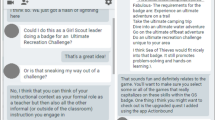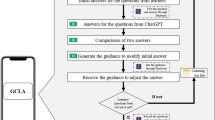Abstract
This paper describes a co-design process for a formative assessment tool in the area of core competencies such as creativity, communication, collaboration, and critical thinking. This process has been carried out in the context of non-formal science education institutions in 19 countries in Europe and the Middle East. The results of the co-design have been influential in the design of a formative assessment chatbot and survey that supports learner competency and self-regulation. We also discuss some preliminary results from the use of the tool and introduce additional considerations with regard to inclusion, technical aspects, and ethics, towards a set of best practices in this area.
Access this chapter
Tax calculation will be finalised at checkout
Purchases are for personal use only
Similar content being viewed by others
Notes
- 1.
- 2.
- 3.
- 4.
- 5.
- 6.
- 7.
- 8.
- 9.
Working definition adopted from: https://idrc.ocadu.ca/resources/idrc-online/49-articles-and-papers/443-whatisinclusivedesign.
- 10.
- 11.
- 12.
Planned languages to date are Arabic, Dutch, English, Farsi, French, German, Greek, Hebrew, Irish, Italian, Serbian, and Slovenian.
- 13.
- 14.
- 15.
- 16.
References
Bigham, J.P., Aller, M.B., Brudvik, J.T., Leung, J.O., Yazzolino, L.A., Ladner, R.E.: Inspiring blind high school students to pursue computer science with instant messaging chatbots. In: ACM SIGCSE Bulletin, vol. 40, no. 1, pp. 449–453. ACM (2008)
Bonsignore, E., et al.: Embedding participatory design into designs for learning: an untapped interdisciplinary resource. In: Proceedings of CSCL, vol. 13 (2013)
Bruce, B.C.: Technology as social practice. Educ. Found. 10(4), 51–58 (1996)
Costa, A., Kallick, B.: Assessment Strategies for Self-Directed Learning. Corwin, Thousand Oaks (2004)
Crown, S., Fuentes, A., Jones, R., Nambiar, R., Crown, D.: Ann G. Neering: interactive chatbot to motivate and engage engineering students. Am. Soc. Eng. Educ. 15(1), 1–13 (2010)
Elsevier artificial intelligence program. In: Artificial Intelligence: How Knowledge is Created, Transferred, and Used, pp. 70–77. Elsevier (2018)
Følstad, A., Brandtzaeg, P.B., Feltwell, T., Law, E.L., Tscheligi, M., Luger, E.A.: Sig: chatbots for social good. In Extended Abstract, CHI Conference. ACM (2018)
Garcia Brustenga, G., Fuertes-Alpiste, M., Molas-Castells, N.: Briefing paper: chatbots in education. eLearn Center, Barcelona. Universitat Oberta de Catalunya (2018)
Kipp, K., Kapros, E., O’Keeffe, I.: A universally accessible self-assessment gamified framework and software application to capture 21st century skills. In: Kapros, E., Koutsombogera, M. (eds.) Designing for the User Experience in Learning Systems. HIS, pp. 41–64. Springer, Cham (2018). https://doi.org/10.1007/978-3-319-94794-5_3
Kapros, E., Koutsombogera, M.: Introduction: user experience in and for learning. In: Kapros, E., Koutsombogera, M. (eds.) Designing for the User Experience in Learning Systems. HIS, pp. 1–13. Springer, Cham (2018). https://doi.org/10.1007/978-3-319-94794-5_1
Leinonen, T., Toikkanen, T., Silfvast, K.: Software as hypothesis: research-based design methodology. In: Proceedings of the Tenth Anniversary Conference on Participatory Design 2008, pp. 61–70. Indiana University (2008)
Nadler, A., Crain, M., Donovan, J.: Weaponizing the digital influence machine: the political perils of online ad tech. Data & Society Research Institute (2018)
Organization for Economic Cooperation and Development (OECD): Pisa 2015 Draft Collaborative Problem Solving Framework. OECD (2013)
Panadero, E., Alonso-Tapia, J.: Self-assessment: theoretical and practical connotations, when it happens, how is it acquired and what to do to develop it in our students. Electron. J. Res. Educ. Psychol. 11(2), 551–576 (2013)
Penuel, W.R., Roschelle, J., Shechtman, N.: Designing formative assessment software with teachers: an analysis of the co-design process. Res. Pract. Technol. Enhanc. Learn. 2(01), 51–74 (2007)
Rajendran, G., Mitchell, P.: Computer mediated interaction in Asperger’s syndrome: the bubble dialogue program. Comput. Educ. 35(3), 189–207 (2000)
Sanders, E.B.N.: From user-centered to participatory design approaches. In: Design and the Social Sciences, pp. 18–25. CRC Press (2002)
Sanders, E.B.N., Westerlund, B.: Experiencing, exploring and experimenting in and with co-design spaces. Nordes (4) (2011)
Silvervarg, A., Kirkegaard, C., Nirme, J., Haake, M., Gulz, A.: Steps towards a challenging teachable agent. In: Intelligent Virtual Agents Conference (IVA) (2014)
Spikol, D., Milrad, M., Maldonado, H., Pea, R.: Integrating co-design practices into the development of mobile science collaboratories. In: 2009 Ninth IEEE International Conference on Advanced Learning Technologies, pp. 393–397. IEEE (2009)
Suchman, L., Blomberg, J., Orr, J.E., Trigg, R.: Reconstructing technologies as social practice. Am. Behav. Sci. 43(3), 392–408 (1999)
Warschauer, M., Knobel, M., Stone, L.: Technology and equity in schooling: deconstructing the digital divide. Educ. Policy 18(4), 562–588 (2004)
Winkler, R., Söllner, M.: Unleashing the potential of chatbots in education: a state-of-the-art analysis. In: Academy of Management Annual Meeting (AOM) (2018)
Wegerif, R.: The role of educational software as a support for teaching and learning conversations. Comput. Educ. 43(1), 179–191 (2004)
Zhang, B., Looi, C.K., Seow, P., et al.: Deconstructing and reconstructing: transforming primary science learning via a mobilized curriculum. Comput. Educ. 55(4), 1504–1523 (2010)
Acknowledgements
This research has received funding from the European Union’s Horizon 2020 research and innovation programme under the Grant Agreement No. 788317.
The ARTificial Intelligence Lab programme is co-funded by the Creative Europe Programme for the European Union through the European ARTificial Intelligence Lab project.
Léargas are the National Agency for Erasmus+ in Adult Education, School Education, Vocational Education and Training, and Youth in Ireland.
Author information
Authors and Affiliations
Corresponding author
Editor information
Editors and Affiliations
Rights and permissions
Copyright information
© 2020 Springer Nature Switzerland AG
About this paper
Cite this paper
Durall, E., Kapros, E. (2020). Co-design for a Competency Self-assessment Chatbot and Survey in Science Education. In: Zaphiris, P., Ioannou, A. (eds) Learning and Collaboration Technologies. Human and Technology Ecosystems. HCII 2020. Lecture Notes in Computer Science(), vol 12206. Springer, Cham. https://doi.org/10.1007/978-3-030-50506-6_2
Download citation
DOI: https://doi.org/10.1007/978-3-030-50506-6_2
Published:
Publisher Name: Springer, Cham
Print ISBN: 978-3-030-50505-9
Online ISBN: 978-3-030-50506-6
eBook Packages: Computer ScienceComputer Science (R0)




